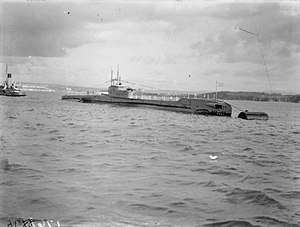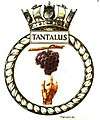HMS Tantalus (P318)
HMS Tantalus was a British submarine of the third group of the T class. She was built as P318 by Vickers Armstrong, Barrow, and launched on 24 February 1943. So far she has been the only ship of the Royal Navy to bear the name Tantalus, after the mythological Tantalus, son of Zeus.
 HMS Tantalus in Plymouth Sound in August 1948 | |
| History | |
|---|---|
| Name: | HMS Tantalus |
| Builder: | Vickers Armstrong, Barrow |
| Laid down: | 6 June 1942 |
| Launched: | 24 February 1943 |
| Commissioned: | 2 June 1943 |
| Fate: | Scrapped in November 1950 |
| Badge: |
 |
| General characteristics | |
| Class and type: | British T class submarine |
| Displacement: |
|
| Length: | 276 ft 6 in (84.28 m) |
| Beam: | 25 ft 6 in (7.77 m) |
| Draught: |
|
| Propulsion: |
|
| Speed: |
|
| Range: | 4,500 nautical miles at 11 knots (8,330 km at 20 km/h) surfaced |
| Test depth: | 300 ft (91 m) max |
| Complement: | 61 |
| Armament: |
|
Service
Tantalus served in the Far East for much of her wartime career. She sank the Malaysian tug Kampung Besar, and the Malaysian Pulo Salanama in April 1944; she went on to sink the Japanese army cargo ships Amagi Maru and Hiyoshi Maru, the Japanese cargo ship Hachijin Maru, the Japanese coaster Palang Maru, the Japanese fishing vessel Taisei Maru No. 12, a Japanese tug and three barges, an unknown Japanese vessel, and a Siamese sailing vessel, whilst claiming to have damaged a second. Tantalus also damaged a tug and the Japanese submarine chaser Ch 1. She also attacked, but missed the Japanese submarine I-166, which was sunk later that day by HMS Telemachus.
Tantalus survived the war and continued in service with the Royal Navy, finally being scrapped at Milford Haven in November 1950.[1]
References
- HMS Tantalus, Uboat.net
- Colledge, J. J.; Warlow, Ben (2006) [1969]. Ships of the Royal Navy: The Complete Record of all Fighting Ships of the Royal Navy (Rev. ed.). London: Chatham Publishing. ISBN 978-1-86176-281-8.
- Hutchinson, Robert (2001). Jane's Submarines: War Beneath the Waves from 1776 to the Present Day. London: HarperCollins. ISBN 978-0-00-710558-8. OCLC 53783010.